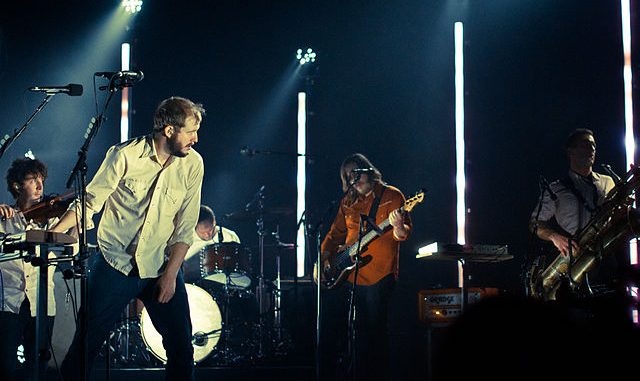
Bon Iver founder Justin Vernon learned a lot in the band’s five-year absence. Gone from his repertoire are the ambient folk melodies of Midwestern nostalgia, in their stead an airy synthetic folktronica soundscape peppered with a myriad of vocal distortions. After half a decade away from the band, Vernon has uprooted Bon Iver’s aesthetic from its Wisconsin earthiness, and “22, A Million” is no weaker because of it.
It must be made clear, however, that despite Vernon’s deliberate reframing of what folk music “should” sound like, it would be slightly misleading to slap the label of “experimental” on the entirety of this album. Tracks like “33 ‘GOD’” and “10 d E A T h b R E a s T ⚄ ⚄” recall the prototypical song structures of the last Bon Iver project: quaint rising action supplanted by a post-rock explosion of brass and woodwind instruments. In cases like this, Vernon’s experimentation only goes as far as what fills the musical template; the template itself, excellent as it is, remains untouched.
At its best, “22, A Million” finds new ways to use Bon Iver’s past elements of value in this new electronic context. “21 M♢♢N WATER” creates a thick cloud of chaotic ambience, only to smash through it with a glitchy saxophone showcase at the end. Vernon’s autotuned crooning on the acapella “715 – CRΣΣKS” evokes the kind of vocal stylings most commonly associated with Kanye West’s recent projects — that Vernon would pick up influence from West is no surprise given Vernon’s guest presence on three of West’s albums this decade.
“____45_____” feeds some sort of horn or wood instrument (the specific kind is unclear) into the same Kanye West autotune filter to produce robotic harmonica.
The other major influence at play here is James Blake, whose recent album “The Colour in Anything” featured Vernon as a guest vocalist in its back half. Jagged vocal loops serving as the backbone of “22 (OVER S∞∞N)” bring to mind the James Blake track “Points,” in which Blake’s lamentation that “It’s sad that you’re no longer her” becomes its own song’s instrumental pavement. Whereas Blake, however, was always comfortable lurking in ice-cold artifice, Vernon imbues even his synthetic material with flesh-and-blood warmth and humanity.
That warmth and humanity are ultimately what make “22, A Million” so quintessentially Bon Iver, even as Vernon trades in acoustic instruments for synthesizers. This is to Vernon what “Highway 61 Revisited” was to Bob Dylan — an album-wide career recalibration marked by a drastic change in equipment — and just as Dylan never lost his sprawling sense of Americana, so too does Vernon retain the contemplative Midwestern soul of his music.
What is, perhaps, most comforting about “22, A Million” is not how fresh it sounds after a five-year absence, but rather how familiar it truly feels in spite of its new genre influences.
“These will just be places to me now,” sings Vernon in “33 ‘GOD’”; his focus on relationships has shifted from locations to people, but the manner in which he explores this new subject of interpersonal relationships is just as enigmatic and beautiful. The relationships we forge in life are no less thematically relevant to American folk than the memories we tie to locations. Ultimately, what Vernon has crafted with “22, A Million” is an exquisite American folk record; he just happened to use synthesizers to do it.
